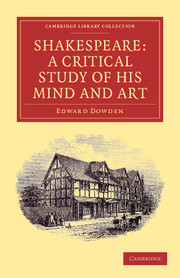Book contents
- Frontmatter
- PREFACE
- Contents
- CHAPTER I SHAKSPERE AND THE ELIZABETHAN AGE
- CHAPTER II THE GROWTH OF SHAKSPERE'S MIND AND ART
- CHAPTER III THE FIRST, AND THE SECOND TRAGEDY; ROMEO AND JULIET; HAMLET
- CHAPTER IV THE ENGLISH HISTORICAL PLAYS
- CHAPTER V OTHELLO: MACBETH: LEAR
- CHAPTER VI THE ROMAN PLAYS
- CHAPTER VII THE HUMOUR OF SHAKSPERE
- CHAPTER VIII SHAKSPERE'S LAST PLAYS
- Frontmatter
- PREFACE
- Contents
- CHAPTER I SHAKSPERE AND THE ELIZABETHAN AGE
- CHAPTER II THE GROWTH OF SHAKSPERE'S MIND AND ART
- CHAPTER III THE FIRST, AND THE SECOND TRAGEDY; ROMEO AND JULIET; HAMLET
- CHAPTER IV THE ENGLISH HISTORICAL PLAYS
- CHAPTER V OTHELLO: MACBETH: LEAR
- CHAPTER VI THE ROMAN PLAYS
- CHAPTER VII THE HUMOUR OF SHAKSPERE
- CHAPTER VIII SHAKSPERE'S LAST PLAYS
Summary
The attempt made in this volume to connect the study of Shakspere's works with an inquiry after the personality of the writer, and to observe, as far as is possible, in its several stages the growth of his intellect and character from youth to full maturity, distinguishes the work from the greater number of preceding criticisms of Shakspere. A sense of hazard and difficulty necessarily accompanies the attempt to pass through the creations of a great dramatic poet to the mind of the creator. Still no one, I suppose, would maintain that a product of mind, so large and manifold as the writings of Shakspere, can fail in some measure to reveal its origin and cause.
The reader must not fall into the error of supposing that I endeavour to identify Shakspere with any one of his dramatic personages. The complex nature of the poet contained a love-idealist like Romeo—(students of the Sonnets will not find it difficult to admit the possibility of this); it contained a speculative intellect like that of Hamlet. But the complete Shakspere was unlike Romeo, and unlike Hamlet. Still it is evident, not from one play, but from many, that the struggle between “blood” and “judgment” was a great affair of Shakspere's life; and in all his later works we observe the effort to control a wistful curiosity about the mysteries of human existence.
- Type
- Chapter
- Information
- Publisher: Cambridge University PressPrint publication year: 2009First published in: 1875

